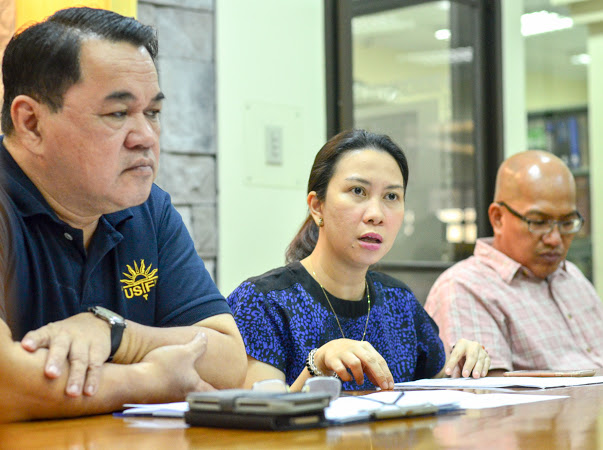THE PROVISIONS of the proposed collective bargaining agreement (CBA) for 2016 to 2021 are up for a “major overhaul” as the elected negotiators of the 1,900-strong UST Faculty Union (USTFU) aim for an “inclusive” CBA in the following academic years.
Five faculty negotiators said “no one will be left behind” in negotiations for a new collective bargaining agreement (CBA) with the UST administration, vowing to be transparent to faculty union members.
“The idea is to improve the proposal. It has always been our philosophy, we want each faculty to be informed. We want transparency in this new CBA [negotiations],” Michelle Desierto, secretary of the union’s negotiating panel, told the Varsitarian in an interview.
The panel of faculty negotiators for the CBA is led by lawyer Jose Ngo Jr., with Rebecca Adri, Dr. Edilberto Gonzaga, Emerito Gonzales and Desierto as panel members.

Article 13, Section 1 of the charter of the UST Faculty Union (USTFU) states that “collective bargaining for and in behalf of the general membership shall be undertaken by the Board of Officers through a negotiating panel, the members of which shall be duly elected by the general membership.”
The CBA is a contract executed between the employer and a labor union which lays down the terms and conditions of the employees regarding pay, working hours and benefits.
Members of the panel for the University administration have yet to be named.
The negotiations are long overdue. The last CBA was ratified by the faculty in 2014, covering the years 2011 to 2016.
Faculty, admin priorities
The first consolidated CBA draft, which was distributed to USTFU members for review in September, proposed a reduction of the faculty members’ academic loads, new hospitalization benefits, representation in the Academic Senate and implementation of the “long overdue” daycare center for the faculty members’ children, among others.
The panel also wants to cut the number of students per laboratory and lecture classes to conform with the standards of the Association of Southeast Asian Nations University Quality Network, which recommends no more than 30 students per class.
Promotion, reclassification policy first
Former USTFU vice president Rene Luis Tadle said the promotion and the reclassification of the faculty members should be prioritized in the new CBA.
He said there should be different tools of evaluation for the teaching, non-teaching staff and faculty researchers.
“There is a need to change the evaluation tool. Kasi there’s only one evaluation tool for all these ranks, when in reality, the expectations from these ranks [are] different,” Tadle said in a phone interview.
Clarita Carillo, who led the UST panel during the CBA negotiations in 2014, said the administration’s priority was to make sure that the provisions of the CBA would serve the best interest of the Thomasian community and not just one party.
“[The administration] views [these] provisions based on how these could affect the University in terms of [the] quality of teaching, quality of research, quality of teaching staff, classroom policies, general academic policies, and the delivery of its various services,” Carillo said in an email.
Bigger share of tuition hikes
Gonzaga, vice chairman of the union’s negotiating panel, said the negotiation proper could last from a semester up to an entire academic year.
But Desierto said the length of the negotiation would still depend on how fast the administration could provide the documents needed, including the audited financial statements of the University and the utilization of tuition increases.
Gonzales said the panel would push for a share in the tuition increase “above what it is according to law.”
“[H]indi kami puwede mag-stay doon sa 70 percent [tuition fee increase na sinabi ng batas sa amin]. Otherwise, bakit pa kami nakipag-negotiate? If [it is] mandated by law, why negotiate? Kung sinabi ng batas na 70 percent lang sa amin, we are going to [push for] kahit one or two percent higher, we are going to negotiate something higher than what is mandated for us,” he added.
Under the law, 70 percent of tuition increases must go to salaries, wages, allowances and other benefits of teaching and non-teaching personnel; while 20 percent must go to the improvement or modernization of buildings, equipment, libraries, laboratories and similar facilities, and payment for other operational costs.
The remaining 10 percent must go to return of investments for higher educational institutions if they are stock corporations. Otherwise, it must be used for operations.
Deadlock
Carillo said one of the challenges the administration faced in previous negotiations was studying how each provision would affect the faculty, the students and the quality of education delivered by the University.
She said the management panel had to view the provisions from a “holistic” perspective.
“The management panel…is expected to review [the proposals] very carefully, thoroughly, and wisely… Whether or not they agree on matters that will be proposed and discussed in the negotiating table can have a lasting impact on the University,” she said.
She also lamented the misinformation that could spread during the negotiations, which sometimes cause “unnecessary agitation and tension.”
“The CBA affects not only the parties represented by their unions; it can also affect the overall conditions by which the University will be run or managed,” she said.
In 2014, the University reached a deadlock in the negotiations with USTFU. A deadlock is declared when the management and employee panels fail to agree on certain proposals during CBA negotiations.
The CBA negotiations however continued because of the “back-channel talks” between USTFU President Dr. George Lim and University Rector Fr. Herminio Dagohoy, O.P.


















